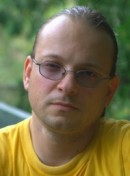|
Plenary
Lecture
Grammar-Based System Specification for Fun and Profit

Associate Professor Stefan D. Bruda
Dept. of Computer Science
Bishop's University
Quebec, Canada
E-mail:
stefan@bruda.ca
Abstract: The specification of programming languages
has long benefited from a powerful system, namely the
context-free grammar which allows for a natural language
specification and is then "compiled" into an automaton
that performs the actual parsing. The same pattern
(grammars for specification, automata for
implementation) is manifest in the realm of formal
methods. Here however tools have been essentially
limited to a less powerful formalism; indeed, most
process algebrae used in practice for specifying
computing systems are just another name for regular
grammars, which are considerably less expressive than
their context-free counterparts. Using regular grammars
thus limits the constructs that can be specified;
recursion in particular can only be used in very limited
forms, which makes the specification of complex software
impossible for all practical purposes. Still, the reason
regular grammars continue to be the norm in formal
methods is that certain language-theoretic properties
show that context-free languages are paradoxically less
expressive than regular language in the context of
system specification, they being able to model recursion
alright, but unable to model other common scenarios such
as concurrency. Recently, new tools based on
context-free grammars have emerged; such a success
remains however in the realm of automata, that is, they
do not have any convenient associated "specification
language." On-going research is currently attempting to
start on the grammatical side, with the eventual goal of
creating process algebrae that are capable of handling
both recursion and concurrency. In turn, such algebrae
will permit complete specifications for complex
application software, which today are simply too complex
to handle. In this talk I will present the effort of
going beyond regular grammars in formal methods. I will
summarize the automata side and I will also outline the
grammatical approaches. We will see that such an effort
is rich and interesting (hence the "fun" in the title)
and also has tremendous practical applications (hence
the "profit"). On the other hand, we will also see that
numerous challenges (both theoretical and practical)
have yet to be tackled.
Brief Biography of the Speaker:
Dr. Stefan D. Bruda has a successful career as
researcher in Computer Science, with over 50
publications so far. His research has spanned at least
four major areas (formal languages and automata, formal
methods, parallel computation, and artificial
intelligence). His main research interest is now formal
methods, but he also continues to be interested in
formal languages, more precisely in grammatical
approaches to parallelism (which will likely be useful
in the area of formal methods). Dr. Bruda's research has
been continuously funded by a major federal funding
agency (the National Science and Engineering Research
Council of Canada) since the start of his professional
career. His research has also been funded by provincial
agencies and other sources. Dr. Bruda acts as an editor
for the Parallel Processing Letters journal. He has been
active as a reviewer to several conferences, journals
(including Theoretical Computer Science and Parallel
Processing Letters), and funding agencies (including
NSERC in Canada and the CHIST-ERA Consortium in the
European Union). He has been invited two times as
plenary speaker to international conferences (but had to
decline one). Since December 2011 he is a Senior Member
of the Association of Computing Machinery (ACM).
|
